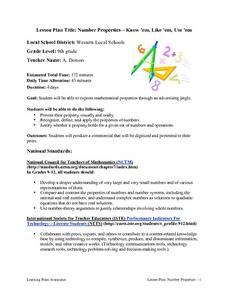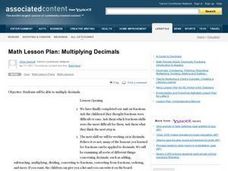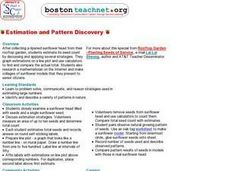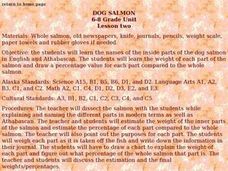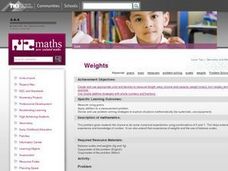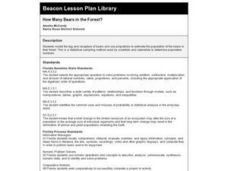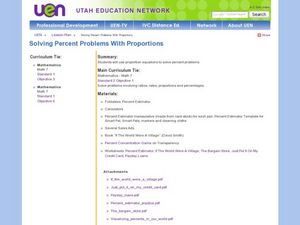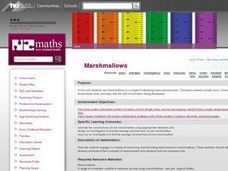Curated OER
Number Properties-Know'em, Like'em, Use'em
Ninth graders explore mathematical properties through the use of an advertising jingle. They produce a commercial that is digitized and presented to the class. Students write a jingle that simplifies each property and helps classmates...
Curated OER
The Fall of the Dollar
Students synthesize the basic workings of the international market for foreign exchange, especially how exchange rates are determined, how the value of a nation's currency is connected to its international trade, and how governmental...
Curated OER
Vector Manipulation Unit
Students are introduced to the concept/idea of a vector, what it represents and why they are used. They develop an understanding of what vectors are, how and why they are used.
Curated OER
Count on Math
Students develop number sense up to a million. In this developing number sense up to a million lesson, students count their breaths in given time span. Students use blocks representing 10's and 100's to create a million. Students use...
Curated OER
Multiplying Decimals
In this math worksheet, students complete a page that provides a step by step explanation of how to multiply decimal numbers to the hundredths place. Students answer 8 questions and may choose some extension activities with a partner.
Curated OER
Estimation and Pattern Discovery
Students collect sunflower heads from their community garden. They estimate its seed count using different strategies. They graph their estimations on a graph and use calculators to find the actual total.
Curated OER
Dog Salmon Lesson Two
Young scholars identify the inside parts of a dog salmon in English and Athabascan. They weigh each part of the salmon and determine the percentage of the whole that the part represents.
Curated OER
Over and Under Estimation
First graders distinguish between an over-estimate and an under-estimate. They estimate the number of beans that can be held in a hand, organize data and actual findings.
Curated OER
Estimating Fish Populations
Students describe the mark/recapture method used to estimate fish populations. They explain the importance of being able to predict population numbers.
Curated OER
Powers of 10
Students explore universe, and examine how big it really is and how scientists measure the distances or sizes of things by estimating sizes of different objects and reading and writing numbers in scientific notations.
Curated OER
And Around We Go!
Sixth graders conduct a survey and collect data to construct a bar graph that will then be changed into a circle graph. With the bar graph, 6th graders compare estimated fractions and percentages and estimate percentages. With the circle...
Curated OER
Making Rectangles
Students study rectangles. In this math activity, students use numbers, measurements and geometry to draw rectangles of varying sizes.
Curated OER
What Colors Are Your Skittles?
Students record the numbers of each color in their own Skittles. They compare their results with their partner. Students create a spreadsheet to chart the different colors found in a package of Skittles. They create a PowerPoint...
Curated OER
Weights
Students find an object that they estimate weighs 20g and check estimates on the balance scales. They read the problem and work in pairs focusing their understanding on the size of grams.
Curated OER
Easy Estimation
Students use estimation as a math strategy. Students estimate the number of small snacks that are presented to them. Students count the snack items after they have estimated how many there are, before the class snack on a daily basis.
Curated OER
How Many Bears in the Forest?
Third graders model the tag and recapture of bears and use proportions to estimate the population of the bears in their forest. This is a statistical sampling method used by scientists and naturalists to determine population numbers.
Curated OER
Solving Percent Problems with Proportions
Seventh graders explore the concept of percent problems. In this percent problem instructional activity, 7th graders use proportion equations to solve percent problems. Students find percentages of numbers and use proportions to...
Curated OER
Measurement: Lesson 2
Eighth graders complete math problems given in this lesson, where they find the perimeter and area of specific figures. They estimate the perimeter and area of shapes and figures and then complete the mathematical formula to find the...
Curated OER
River Width
Students determine the level of accuracy needed for computations involving measurements and irrational numbers. They use the correct number of digits in computation to achieve an appropriate unit or level of accuracy when solving...
Curated OER
Marshmallows
Third graders estimate the volume and mass of one marshmallow using appropriate standard units. They design and carry out an investigation to find the average of volume/mass of one marshmallow.
Curated OER
Measurement
Students use arithmetic in a practical situation using time and distance.
As the calculations involved in this problem involve single digit addition and multiplication it offers a good opportunity to encourage the students's use of...
Curated OER
Locating the Salt Front
Learners use Hudson River salinity data to create a line
graph that shows the location of the salt front, and use math
skills to explore how this location varies over time. They use the graph to estimate the location of the salt front...
Curated OER
Conversions That Make Cents
Eighth graders practice calculating problems using addition, subtraction, multiplication and division. They estimate solutions to algebraic problems. They also graph their solutions.
Curated OER
Scavenger Hunt
Second graders participate in a Scavenger Hunt to find out how long 1 cm is. They then find 10 objects that estimate to be 1 cm in length and record their findings on the table provided and check their estimates using a ruler.
Other popular searches
- Compatible Numbers to Estimate
- Estimate Numbers Lesson Plan
- Estimate Numbers Grade 5
- Round and Estimate Numbers


